|
|
|
Sort Order |
|
|
|
Items / Page
|
|
|
|
|
|
|
| Srl | Item |
| 1 |
ID:
139032


|
|
|
|
|
| Summary/Abstract |
In July 2014, Japanese Prime Minister Shinzo Abe announced that his cabinet had approved a reinterpretation of the country’s constitution. Although Article 9 of the document, effected in 1947, stated that Japan had forever renounced war as a sovereign right, the change meant that the Japanese Self- Defense Forces (JSDF) would, for the first time since their founding in 1954, be permitted to participate in acts of collective self-defence (generally understood to be the right to use force to repel an armed attack against a foreign country that has a close relationship with one’s own country). Abe’s historic plan sparked criticism from China and South Korea, two countries affected by Japanese aggression during the Second World War. Both countries issued warnings about the resurgence of Japanese militarism, amid growing concerns that both China and Japan were leading an arms race in East Asia.
|
|
|
|
|
|
|
|
|
|
|
|
|
|
|
|
| 2 |
ID:
117912
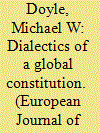

|
|
|
|
|
| Publication |
2012.
|
| Summary/Abstract |
As a decentralized legal order, the international system arguably has no single constitution, but the closest candidate to a constitution that it does have is the UN Charter. Thus it is worth exploring how constitutional the Charter is in theory and practice. Sixty-plus years into its evolution we can see two dominant features. First, its key constitutional elements are: supranationality in its various forms; inequality; and, like all constitutions, an 'invitation to struggle' that leads to inevitable pushback from states when UN authority expands. Second, unlike in many domestic constitutions, the pushback more than holds its own. The UN has neither integrated its parts nor centralized authority. To illustrate those points, I start with a comparison of the UN Charter to both capital 'C' domestic constitutions and to ordinary treaties. I then address with a broad brush the main features of the UN's supranationality and inequality. The Secretariat and its neutrality and independence are the next topics. I then consider two examples of tension between UN supranationality and sovereignty. I explore the trend toward 'global legislation' associated with the Security Council's counter-terrorist resolutions, 1373 and 1540. I then focus on the example of the Millennium Development Goals, the UN's recent attempt to remake itself as a development body. I conclude with a discussion of the wider constitutional significance and prospects of the UN in the light of the contrasting success of the history of US federalism and European integration.
|
|
|
|
|
|
|
|
|
|
|
|
|
|
|
|
| 3 |
ID:
192139
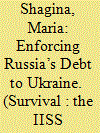

|
|
|
|
|
| Summary/Abstract |
As Russia continues to wage war against Ukraine, Western calls to confiscate Russian frozen assets to aid Ukraine’s reconstruction have become more urgent. Whether justice on this score will be ultimately delivered remains unclear. Despite many international initiatives to seize Russian assets, legal conservatism and concerns over the disruption of international rules are strong constraints. Finding a legal way to confiscate Russian sovereign assets will require political determination, international coordination and legal creativity.
|
|
|
|
|
|
|
|
|
|
|
|
|
|
|
|
| 4 |
ID:
138047
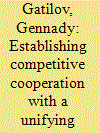

|
|
|
|
|
| Summary/Abstract |
G. Gatilov: Every session of the UN General Assembly is a landmark event that not only sums up the results of the past political year and assesses the status of international relations at the current stage, but also sets out a vector for future movement forward. As they say, the UN, like a mirror, reflects global processes in the political, economic and human rights spheres, as well as collective security issues
|
|
|
|
|
|
|
|
|
|
|
|
|
|
|
|
| 5 |
ID:
138037
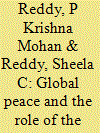

|
|
|
|
|
| Summary/Abstract |
The United States must expand its role and shift focus from the prevention or containment of military conflict to the achievement of comprehensive global peace by ensuring the satisfaction of basic needs for the poorest sectors of humanity.
|
|
|
|
|
|
|
|
|
|
|
|
|
|
|
|
| 6 |
ID:
148774


|
|
|
|
|
| Summary/Abstract |
Today, concepts of constitutionalism are widely used in international legal scholarship, both to describe and to promote changes in the international legal order in support of the rule of law, the protection of human rights and other common values of the international community. Against this background, the present article deals with a question so far addressed only cursorily—the “writtenness” of international constitutional law. Can we assume the existence of an “unwritten” international constitution, or does the very concept of a constitution in the modern sense require that a constitution is laid down in written form? The article discusses the importance of “writtenness” in modern constitutionalism and addresses the “English exception”, that is the absence, in the United Kingdom, of a document called “the constitution”. The paper concludes with a plea for taking the constitutional character of the UN Charter more seriously, arguing that the idea of an unwritten constitution of the international community does not provide a viable alternative.
|
|
|
|
|
|
|
|
|
|
|
|
|
|
|
|
| 7 |
ID:
074011


|
|
|
| 8 |
ID:
146262
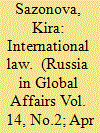

|
|
|
|
|
| Summary/Abstract |
International developments over the last three to five years have created a situation where questioning the practicality of international law, criticizing it for being inefficient and weak, and predicting, with a thoughtful air, its immediate collapse has become not just a commonplace but dominant mode of behavior among many Russian and foreign historians, political analysts and international relations experts. Indeed, the situation does not look encouraging: the cumbersome and overly bureaucratized United Nations; U.S. attempts to establish a unipolar world based on the use of force and diktat; a phantasmagoric caliphate in the Middle East, terrorizing the whole world; the "great transmigration of peoples" on the Eurasian continent-this list can be continued endlessly. Against this background, statements about a "leading and guiding" role of international law may seem too pompous.
|
|
|
|
|
|
|
|
|
|
|
|
|
|
|
|
| 9 |
ID:
142433
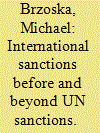

|
|
|
|
|
| Summary/Abstract |
United Nations sanctions are authorized by the international body that is legally charged with the maintenance of international peace and security, the UN Security Council. They are grounded in provisions of the UN Charter. However, only a fraction of all international sanctions are mandated by the UN. One of the findings of this article, which is based on data collected by the Targeted Sanctions Consortium (TSC), is that the large majority of UN sanctions are preceded by non-UN sanctions, particularly sanctions by the United States and the European Union. Furthermore, it is common practice, particularly by the US and the EU, to add sanction provisions of their own to UN sanctions. As a result, for most UN sanctions, there are also non-UN sanctions against the same targets. Such combined sanction regimes add restrictions imposed by only some governments to those that all countries have to implement. Combined sanction regimes are therefore potentially more effective in achieving the targeted outcome than UN sanctions, which represent the lowest common denominator achievable among the members of the UN Security Council. On the other hand, combined sanction regimes might suffer from a type of ‘sanctions fatigue’. A growing number of states outside of the West are openly opposed to unilateral sanctions. Adding non-UN sanctions to UN sanctions might reduce their willingness to support UN sanctions. The TSC data, however, does not support such a contention. Rather, the data indicates that combined sanction regimes are more effective than stand-alone UN sanctions. Still, the US and EU governments—as the main drivers of sanctions policy in general and UN sanctions in particular—need to be aware of this criticism in order not to unwittingly undermine the UN sanctions instrument.
|
|
|
|
|
|
|
|
|
|
|
|
|
|
|
|
| 10 |
ID:
151593
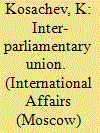

|
|
|
|
|
| Summary/Abstract |
"THE WORLD is made of achieved Utopias. Today's utopia is tomorrow's reality,"1 said Frederic Passy, winner of the first Nobel Peace Prize and one of the two co-founders (together with William Randal Cremer) of the oldest international parliamentary organization.
|
|
|
|
|
|
|
|
|
|
|
|
|
|
|
|
| 11 |
ID:
160482
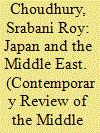

|
|
|
|
|
| Summary/Abstract |
As an introduction to this special issue, this article examines the shaping of Japan’s foreign policy; looking at how Japan has risen to the demand of the international community to assume more responsibility in conflict situations, circumventing a pacifist constitution that it had been dealt with. It then explains relations between Middle East and Japan and shows how the latter has been balancing its national interest in order to conform to its alliance with the United States. With more Asian powers having stake in the Middle East, Japan has become proactive about its role in the region. However, with limited hard power options, Japan would have to concentrate on its soft power capabilities and on using its economic strength to mark its presence in the Middle East.
|
|
|
|
|
|
|
|
|
|
|
|
|
|
|
|
| 12 |
ID:
176028


|
|
|
|
|
| Summary/Abstract |
This article argues that how the United Nations (UN) conceptualizes legitimacy is not only a matter of legalism or power politics. The UN’s conception of legitimacy also utilizes concepts, language and symbolism from the religious realm. Understanding the entanglement between political and religious concepts and the ways of their verbalization at the agential level sheds light on how legitimacy became to be acknowledged as an integral part of the UN and how it changes. At the constitutional level, the article examines phrases and ‘verbal symbols’, enshrined in the Charter of the ‘secular church’ UN. They evoke intrinsic legitimacy claims based on religious concepts and discourse such as hope and salvation. At the agential level, the article illustrates how the Secretary-General verbalizes those abstract constitutional principles of legitimacy. Religious language and symbolism in the constitutional framework and agential practice of the UN does not necessarily produce an exclusive form of legitimacy. This article shows, however, that legitimacy as nested in the UN’s constitutional setting cannot exist without religious templates because they remain a matter of a ‘cultural frame’.
|
|
|
|
|
|
|
|
|
|
|
|
|
|
|
|
| 13 |
ID:
124157
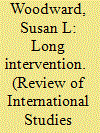

|
|
|
|
|
| Publication |
2013.
|
| Summary/Abstract |
Great Power intervention in the Balkans since the late nineteenth century shows a striking continuity in motivations, methods, and consequences. The article proposes that current intervention practices are largely a response to the Balkan theatre in the 1990s and thus institutionalise this continuity more than arguments about normative and institutional change since 1990 suggest. Three continuities are emphasised: the concept of a 'turbulent frontier' to explain an unintended dynamic of nearly continuous intervention, the importance of local actors' interests (the pull of intervention) alongside those of major power interests (the push), and the primary influence on domestic orders and cause of the 'turbulence' of economic relations.
|
|
|
|
|
|
|
|
|
|
|
|
|
|
|
|
| 14 |
ID:
139728
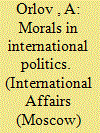

|
|
|
|
|
| Summary/Abstract |
THE WORLD is changing fast; it is changing by leaps and bounds which makes it next to impossible to explain what is going on and to foresee possible repercussions. An unsophisticated observer in the West and elsewhere in the world where Western propaganda is heard and believed might imagine that the forces of freedom and democracy are waging an uncompromising struggle against despotism and tyranny (in the widest sense of the terms). It is implied that the United States and the rest of the civilized West are on the side of the forces of good confronted by an obscure conglomerate of the forces of evil, of which Russia is part if according to President Obama and certain other Western leaders. Former President of France Valéry Giscard d'Estaing has written in his memoirs that according to this interpretation the forces of good insist on democratic elections, human rights, and freedom of trade; America does not hesitate to use its might to defend good and oppose the forces of evil interfering with the fulfillment of these ideals.
|
|
|
|
|
|
|
|
|
|
|
|
|
|
|
|
| 15 |
ID:
140148
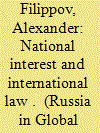

|
|
|
| 16 |
ID:
150134


|
|
|
| 17 |
ID:
147763
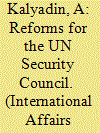

|
|
|
|
|
| Summary/Abstract |
FOR A LONG TIME, there have been heated debates about proposed reforms of the United Nations Security Council.* Various ways of adapting the council to 21st-century realities were suggested at the General Assembly's 70th jubilee session. The main points of controversy were whether, in the event of membership enlargement, the council should increase its number of permanent or non-permanent members and which countries should be included in the permanent group if the latter bacame larger. Unfortunately, these debates don't seem likely to be over any time soon.
|
|
|
|
|
|
|
|
|
|
|
|
|
|
|
|
| 18 |
ID:
159275


|
|
|
|
|
| Summary/Abstract |
THE CREATION of the United Nations marked the end of the World War II and showed the entire world community the way to the peaceful diplomatic settling of conflicts. The work of the organization, created in 1945. was not limited exclusively to questions of war and peace. Prominent among the organization's aims, as laid down in its charter, was its creators' desire to strengthen international cooperation, raise the role of diplomacy, and establish dialogue in the processes of international relations.1 It should be noted here that the area of debate open to the representatives of the UN member countries was formulated to solve a wide variety of problems of the most diverse nature.
|
|
|
|
|
|
|
|
|
|
|
|
|
|
|
|
| 19 |
ID:
138544
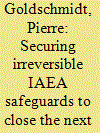

|
|
|
|
|
| Summary/Abstract |
Over time, states have endeavored to improve the effectiveness of the international nonproliferation regime. These efforts have included the adoption by the International Atomic Energy Agency (IAEA) of the Model Additional Protocol to comprehensive safeguards agreements, the tightening by the Nuclear Suppliers Group (NSG) of export criteria on sensitive nuclear fuel-cycle technology, and the adoption of UN Security Council Resolutions 1540 and 1887.
|
|
|
|
|
|
|
|
|
|
|
|
|
|
|
|
| 20 |
ID:
138802
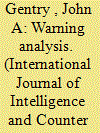

|
|
|
|
|
| Summary/Abstract |
Warning intelligence has traditionally focused on indicators of major military attacks by states against other states. In the United States, the lessons of the Japanese attack on Pearl Harbor in 1941 and the long rivalry with the Soviet Union produced an “indications and warning” (I&W) methodology that studied the military forces and doctrines of potential enemies in order to develop indicators of likely attack. When those indicators were present, a warning message was considered prudent. The classic statement of this approach is Cynthia Grabo's Handbook of Warning Intelligence.
|
|
|
|
|
|
|
|
|
|
|
|
|
|
|
|
|
|
|
|
|